Professional Skills for Accountants Report: Theories and Policies
VerifiedAdded on 2020/10/22
|10
|2726
|62
Report
AI Summary
This report examines essential professional skills for accountants, focusing on scientific management and human relations theories, diversity and equity policies, and performance appraisal processes. It begins by defining the roles of accountants and the importance of professional skills. The report then delves into the scientific management and human relations theories, comparing and contrasting their approaches to enhance managerial skills. It also explores the significance of diversity and equity policies within the context of SJPR Accountants Ltd, along with strategies for ensuring their effectiveness. Finally, the report analyzes different performance appraisal methods, including graphic rating scales, field review methods, management by objectives, and 360-degree appraisals, and discusses how to effectively utilize post-appraisal information to motivate staff and improve performance. The report emphasizes the practical application of these skills within an accounting environment.
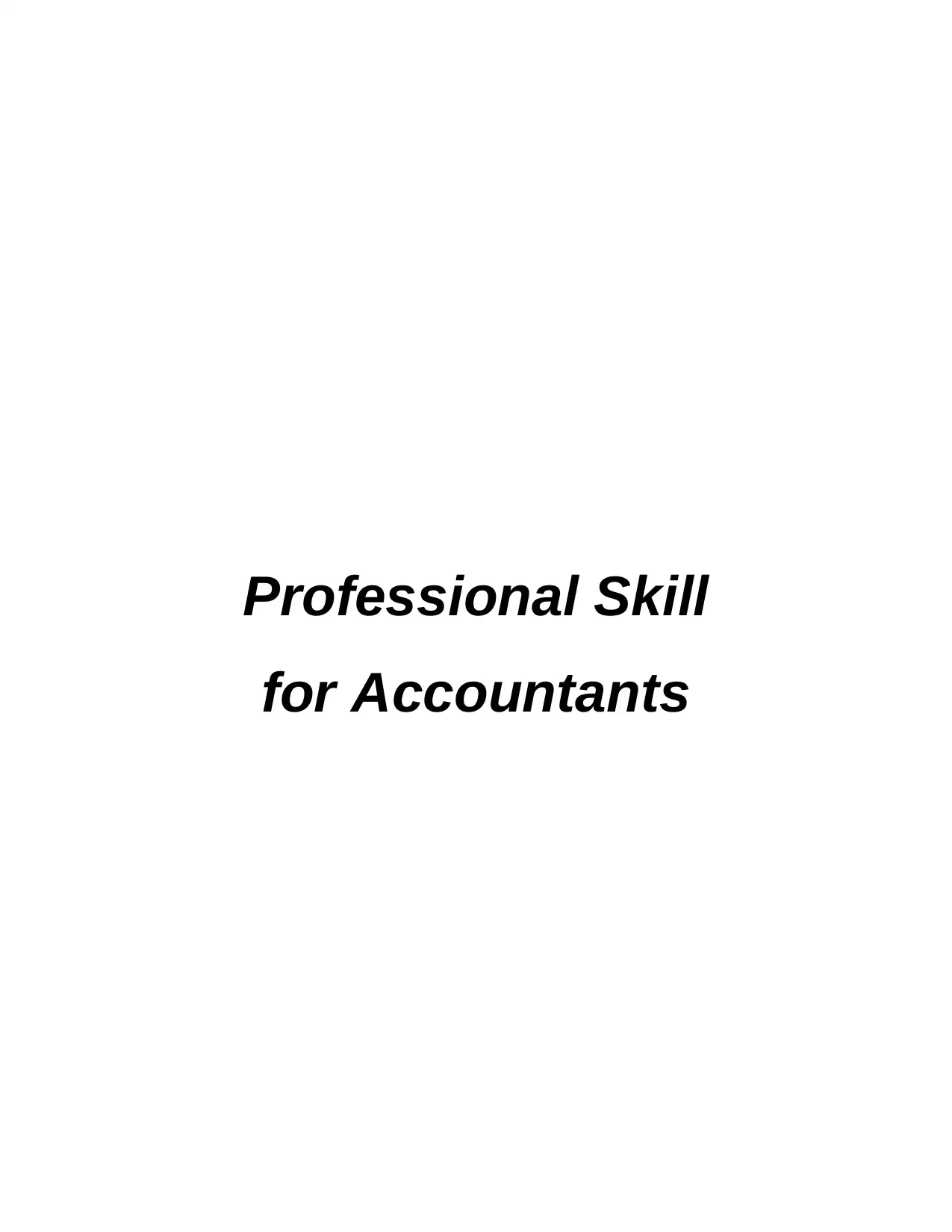
Professional Skill
for Accountants
for Accountants
Paraphrase This Document
Need a fresh take? Get an instant paraphrase of this document with our AI Paraphraser
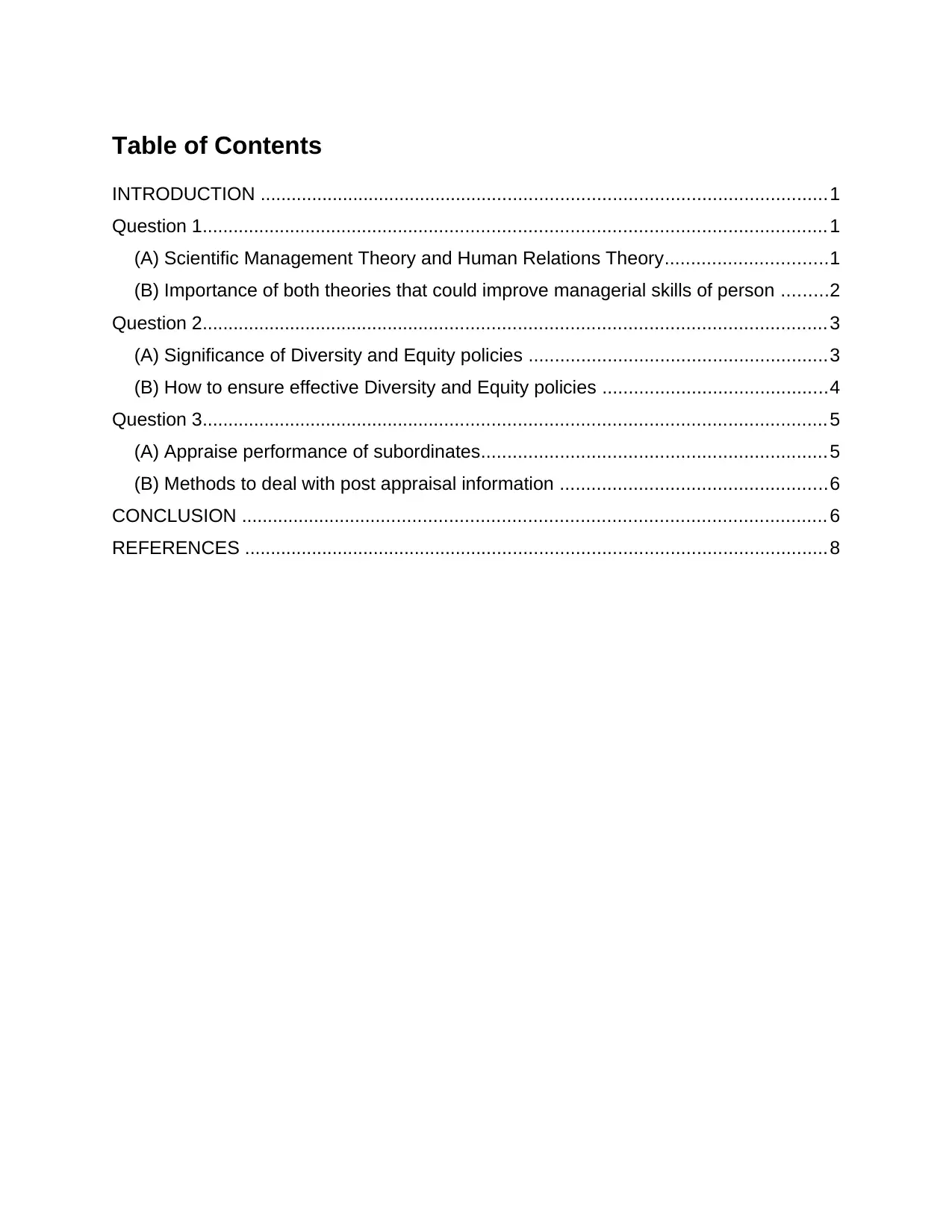
Table of Contents
INTRODUCTION .............................................................................................................1
Question 1........................................................................................................................1
(A) Scientific Management Theory and Human Relations Theory...............................1
(B) Importance of both theories that could improve managerial skills of person .........2
Question 2........................................................................................................................3
(A) Significance of Diversity and Equity policies .........................................................3
(B) How to ensure effective Diversity and Equity policies ...........................................4
Question 3........................................................................................................................5
(A) Appraise performance of subordinates..................................................................5
(B) Methods to deal with post appraisal information ...................................................6
CONCLUSION ................................................................................................................ 6
REFERENCES ................................................................................................................8
INTRODUCTION .............................................................................................................1
Question 1........................................................................................................................1
(A) Scientific Management Theory and Human Relations Theory...............................1
(B) Importance of both theories that could improve managerial skills of person .........2
Question 2........................................................................................................................3
(A) Significance of Diversity and Equity policies .........................................................3
(B) How to ensure effective Diversity and Equity policies ...........................................4
Question 3........................................................................................................................5
(A) Appraise performance of subordinates..................................................................5
(B) Methods to deal with post appraisal information ...................................................6
CONCLUSION ................................................................................................................ 6
REFERENCES ................................................................................................................8
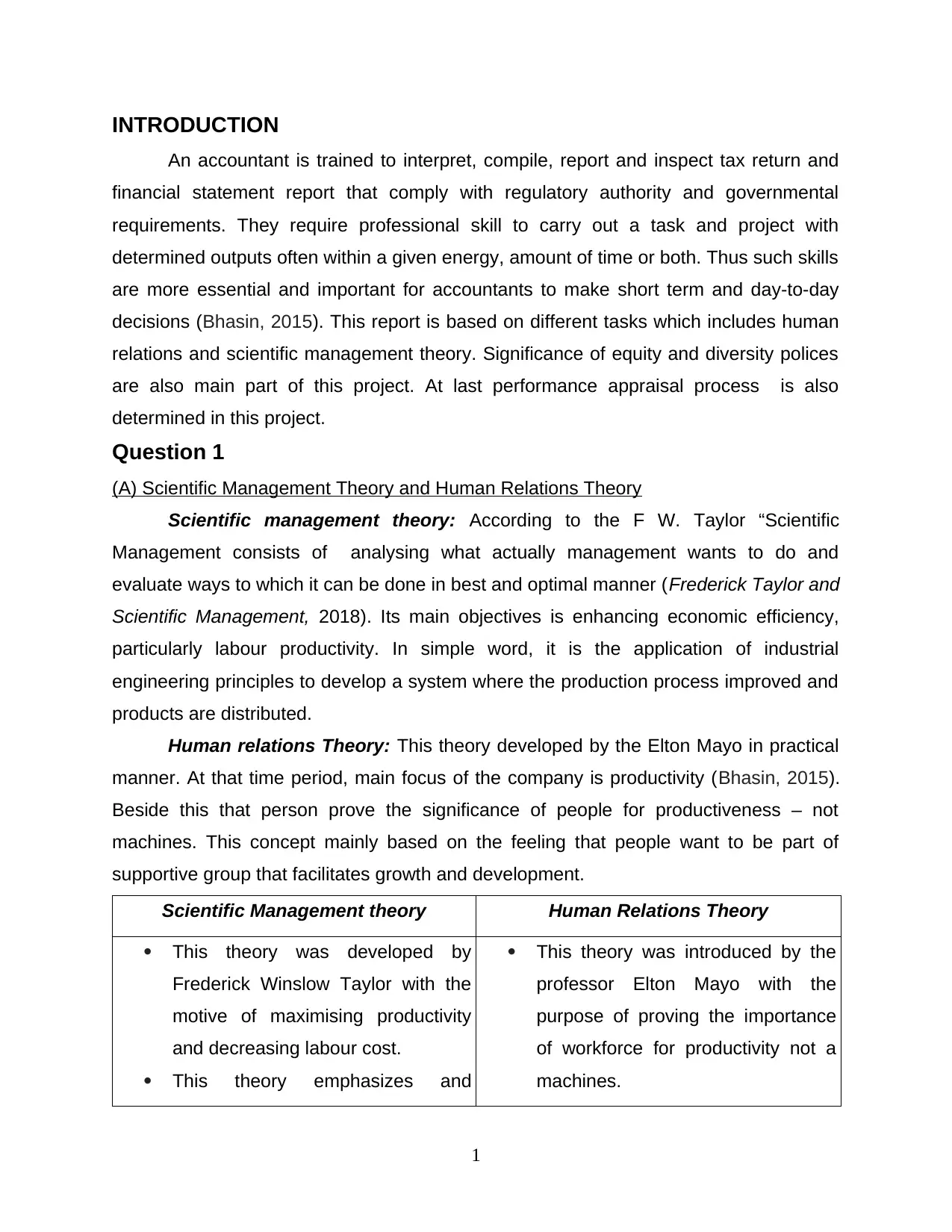
INTRODUCTION
An accountant is trained to interpret, compile, report and inspect tax return and
financial statement report that comply with regulatory authority and governmental
requirements. They require professional skill to carry out a task and project with
determined outputs often within a given energy, amount of time or both. Thus such skills
are more essential and important for accountants to make short term and day-to-day
decisions (Bhasin, 2015). This report is based on different tasks which includes human
relations and scientific management theory. Significance of equity and diversity polices
are also main part of this project. At last performance appraisal process is also
determined in this project.
Question 1
(A) Scientific Management Theory and Human Relations Theory
Scientific management theory: According to the F W. Taylor “Scientific
Management consists of analysing what actually management wants to do and
evaluate ways to which it can be done in best and optimal manner (Frederick Taylor and
Scientific Management, 2018). Its main objectives is enhancing economic efficiency,
particularly labour productivity. In simple word, it is the application of industrial
engineering principles to develop a system where the production process improved and
products are distributed.
Human relations Theory: This theory developed by the Elton Mayo in practical
manner. At that time period, main focus of the company is productivity (Bhasin, 2015).
Beside this that person prove the significance of people for productiveness – not
machines. This concept mainly based on the feeling that people want to be part of
supportive group that facilitates growth and development.
Scientific Management theory Human Relations Theory
This theory was developed by
Frederick Winslow Taylor with the
motive of maximising productivity
and decreasing labour cost.
This theory emphasizes and
This theory was introduced by the
professor Elton Mayo with the
purpose of proving the importance
of workforce for productivity not a
machines.
1
An accountant is trained to interpret, compile, report and inspect tax return and
financial statement report that comply with regulatory authority and governmental
requirements. They require professional skill to carry out a task and project with
determined outputs often within a given energy, amount of time or both. Thus such skills
are more essential and important for accountants to make short term and day-to-day
decisions (Bhasin, 2015). This report is based on different tasks which includes human
relations and scientific management theory. Significance of equity and diversity polices
are also main part of this project. At last performance appraisal process is also
determined in this project.
Question 1
(A) Scientific Management Theory and Human Relations Theory
Scientific management theory: According to the F W. Taylor “Scientific
Management consists of analysing what actually management wants to do and
evaluate ways to which it can be done in best and optimal manner (Frederick Taylor and
Scientific Management, 2018). Its main objectives is enhancing economic efficiency,
particularly labour productivity. In simple word, it is the application of industrial
engineering principles to develop a system where the production process improved and
products are distributed.
Human relations Theory: This theory developed by the Elton Mayo in practical
manner. At that time period, main focus of the company is productivity (Bhasin, 2015).
Beside this that person prove the significance of people for productiveness – not
machines. This concept mainly based on the feeling that people want to be part of
supportive group that facilitates growth and development.
Scientific Management theory Human Relations Theory
This theory was developed by
Frederick Winslow Taylor with the
motive of maximising productivity
and decreasing labour cost.
This theory emphasizes and
This theory was introduced by the
professor Elton Mayo with the
purpose of proving the importance
of workforce for productivity not a
machines.
1
⊘ This is a preview!⊘
Do you want full access?
Subscribe today to unlock all pages.

Trusted by 1+ million students worldwide
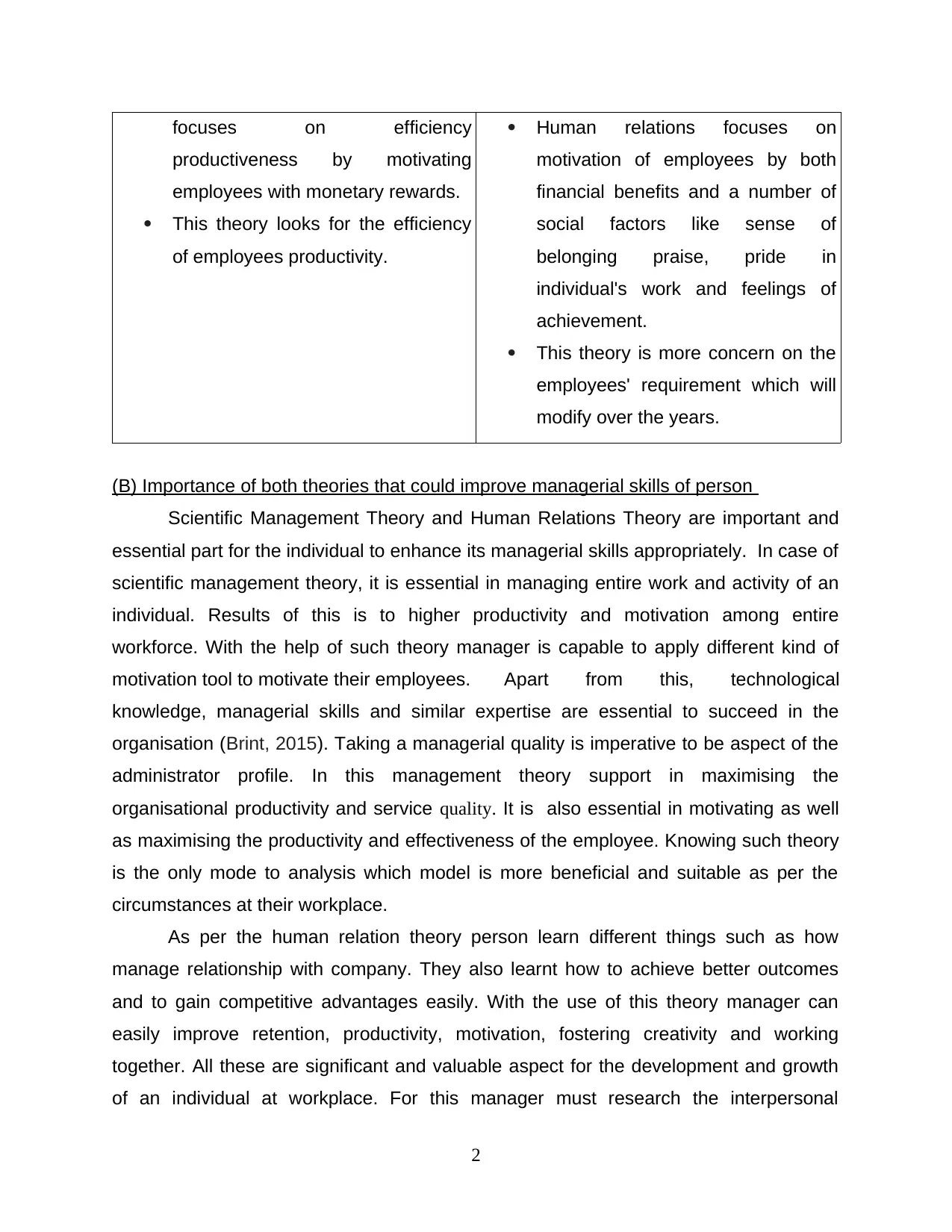
focuses on efficiency
productiveness by motivating
employees with monetary rewards.
This theory looks for the efficiency
of employees productivity.
Human relations focuses on
motivation of employees by both
financial benefits and a number of
social factors like sense of
belonging praise, pride in
individual's work and feelings of
achievement.
This theory is more concern on the
employees' requirement which will
modify over the years.
(B) Importance of both theories that could improve managerial skills of person
Scientific Management Theory and Human Relations Theory are important and
essential part for the individual to enhance its managerial skills appropriately. In case of
scientific management theory, it is essential in managing entire work and activity of an
individual. Results of this is to higher productivity and motivation among entire
workforce. With the help of such theory manager is capable to apply different kind of
motivation tool to motivate their employees. Apart from this, technological
knowledge, managerial skills and similar expertise are essential to succeed in the
organisation (Brint, 2015). Taking a managerial quality is imperative to be aspect of the
administrator profile. In this management theory support in maximising the
organisational productivity and service quality. It is also essential in motivating as well
as maximising the productivity and effectiveness of the employee. Knowing such theory
is the only mode to analysis which model is more beneficial and suitable as per the
circumstances at their workplace.
As per the human relation theory person learn different things such as how
manage relationship with company. They also learnt how to achieve better outcomes
and to gain competitive advantages easily. With the use of this theory manager can
easily improve retention, productivity, motivation, fostering creativity and working
together. All these are significant and valuable aspect for the development and growth
of an individual at workplace. For this manager must research the interpersonal
2
productiveness by motivating
employees with monetary rewards.
This theory looks for the efficiency
of employees productivity.
Human relations focuses on
motivation of employees by both
financial benefits and a number of
social factors like sense of
belonging praise, pride in
individual's work and feelings of
achievement.
This theory is more concern on the
employees' requirement which will
modify over the years.
(B) Importance of both theories that could improve managerial skills of person
Scientific Management Theory and Human Relations Theory are important and
essential part for the individual to enhance its managerial skills appropriately. In case of
scientific management theory, it is essential in managing entire work and activity of an
individual. Results of this is to higher productivity and motivation among entire
workforce. With the help of such theory manager is capable to apply different kind of
motivation tool to motivate their employees. Apart from this, technological
knowledge, managerial skills and similar expertise are essential to succeed in the
organisation (Brint, 2015). Taking a managerial quality is imperative to be aspect of the
administrator profile. In this management theory support in maximising the
organisational productivity and service quality. It is also essential in motivating as well
as maximising the productivity and effectiveness of the employee. Knowing such theory
is the only mode to analysis which model is more beneficial and suitable as per the
circumstances at their workplace.
As per the human relation theory person learn different things such as how
manage relationship with company. They also learnt how to achieve better outcomes
and to gain competitive advantages easily. With the use of this theory manager can
easily improve retention, productivity, motivation, fostering creativity and working
together. All these are significant and valuable aspect for the development and growth
of an individual at workplace. For this manager must research the interpersonal
2
Paraphrase This Document
Need a fresh take? Get an instant paraphrase of this document with our AI Paraphraser
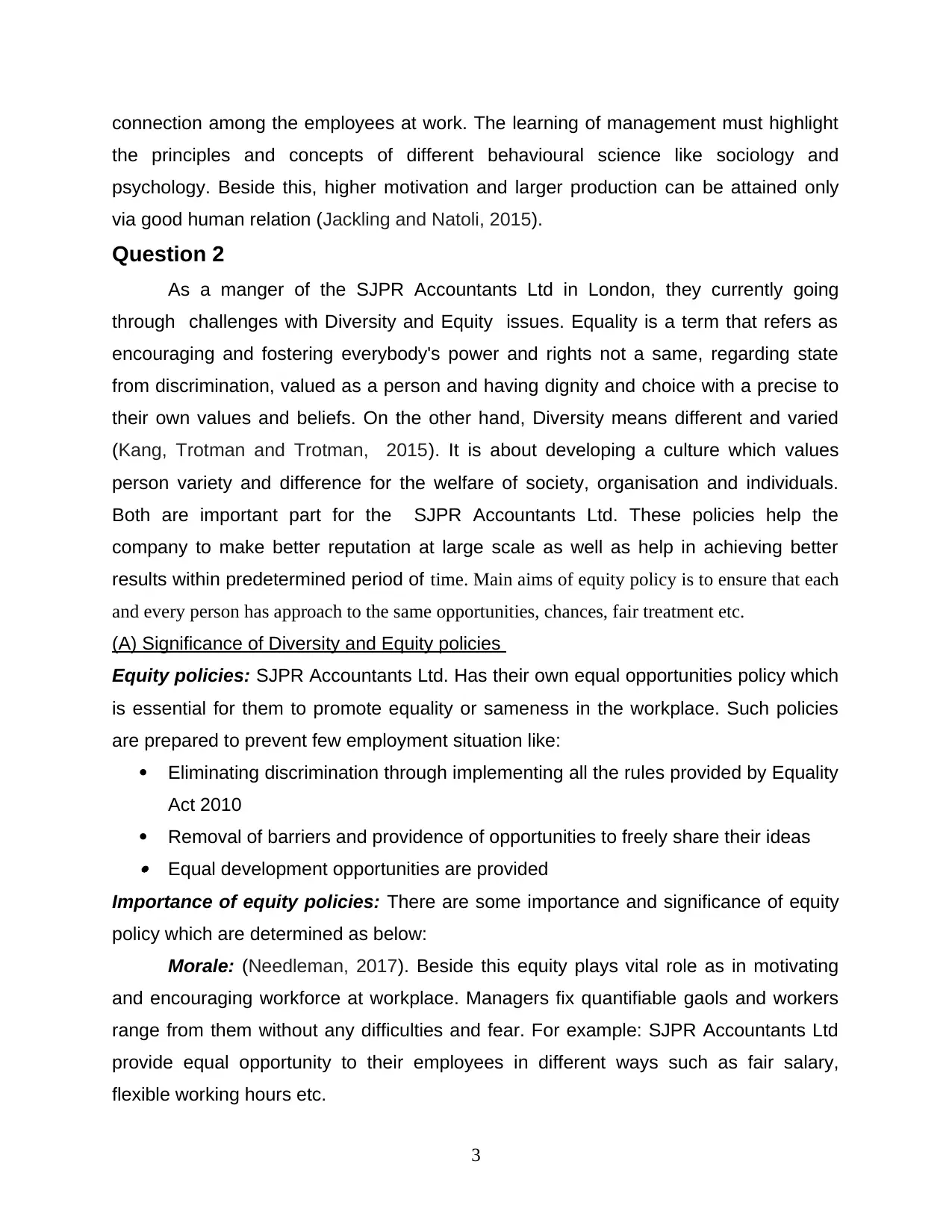
connection among the employees at work. The learning of management must highlight
the principles and concepts of different behavioural science like sociology and
psychology. Beside this, higher motivation and larger production can be attained only
via good human relation (Jackling and Natoli, 2015).
Question 2
As a manger of the SJPR Accountants Ltd in London, they currently going
through challenges with Diversity and Equity issues. Equality is a term that refers as
encouraging and fostering everybody's power and rights not a same, regarding state
from discrimination, valued as a person and having dignity and choice with a precise to
their own values and beliefs. On the other hand, Diversity means different and varied
(Kang, Trotman and Trotman, 2015). It is about developing a culture which values
person variety and difference for the welfare of society, organisation and individuals.
Both are important part for the SJPR Accountants Ltd. These policies help the
company to make better reputation at large scale as well as help in achieving better
results within predetermined period of time. Main aims of equity policy is to ensure that each
and every person has approach to the same opportunities, chances, fair treatment etc.
(A) Significance of Diversity and Equity policies
Equity policies: SJPR Accountants Ltd. Has their own equal opportunities policy which
is essential for them to promote equality or sameness in the workplace. Such policies
are prepared to prevent few employment situation like:
Eliminating discrimination through implementing all the rules provided by Equality
Act 2010
Removal of barriers and providence of opportunities to freely share their ideas Equal development opportunities are provided
Importance of equity policies: There are some importance and significance of equity
policy which are determined as below:
Morale: (Needleman, 2017). Beside this equity plays vital role as in motivating
and encouraging workforce at workplace. Managers fix quantifiable gaols and workers
range from them without any difficulties and fear. For example: SJPR Accountants Ltd
provide equal opportunity to their employees in different ways such as fair salary,
flexible working hours etc.
3
the principles and concepts of different behavioural science like sociology and
psychology. Beside this, higher motivation and larger production can be attained only
via good human relation (Jackling and Natoli, 2015).
Question 2
As a manger of the SJPR Accountants Ltd in London, they currently going
through challenges with Diversity and Equity issues. Equality is a term that refers as
encouraging and fostering everybody's power and rights not a same, regarding state
from discrimination, valued as a person and having dignity and choice with a precise to
their own values and beliefs. On the other hand, Diversity means different and varied
(Kang, Trotman and Trotman, 2015). It is about developing a culture which values
person variety and difference for the welfare of society, organisation and individuals.
Both are important part for the SJPR Accountants Ltd. These policies help the
company to make better reputation at large scale as well as help in achieving better
results within predetermined period of time. Main aims of equity policy is to ensure that each
and every person has approach to the same opportunities, chances, fair treatment etc.
(A) Significance of Diversity and Equity policies
Equity policies: SJPR Accountants Ltd. Has their own equal opportunities policy which
is essential for them to promote equality or sameness in the workplace. Such policies
are prepared to prevent few employment situation like:
Eliminating discrimination through implementing all the rules provided by Equality
Act 2010
Removal of barriers and providence of opportunities to freely share their ideas Equal development opportunities are provided
Importance of equity policies: There are some importance and significance of equity
policy which are determined as below:
Morale: (Needleman, 2017). Beside this equity plays vital role as in motivating
and encouraging workforce at workplace. Managers fix quantifiable gaols and workers
range from them without any difficulties and fear. For example: SJPR Accountants Ltd
provide equal opportunity to their employees in different ways such as fair salary,
flexible working hours etc.
3
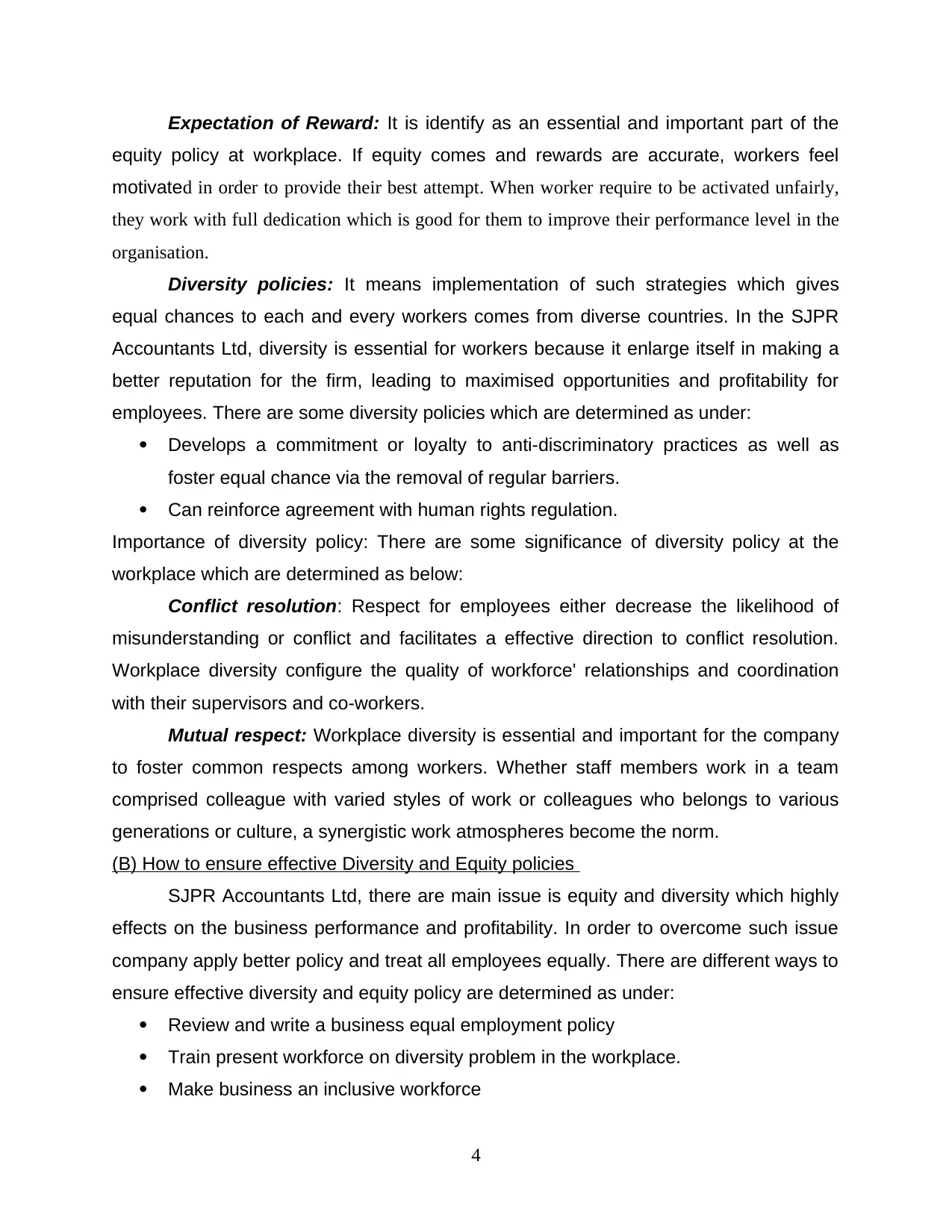
Expectation of Reward: It is identify as an essential and important part of the
equity policy at workplace. If equity comes and rewards are accurate, workers feel
motivated in order to provide their best attempt. When worker require to be activated unfairly,
they work with full dedication which is good for them to improve their performance level in the
organisation.
Diversity policies: It means implementation of such strategies which gives
equal chances to each and every workers comes from diverse countries. In the SJPR
Accountants Ltd, diversity is essential for workers because it enlarge itself in making a
better reputation for the firm, leading to maximised opportunities and profitability for
employees. There are some diversity policies which are determined as under:
Develops a commitment or loyalty to anti-discriminatory practices as well as
foster equal chance via the removal of regular barriers.
Can reinforce agreement with human rights regulation.
Importance of diversity policy: There are some significance of diversity policy at the
workplace which are determined as below:
Conflict resolution: Respect for employees either decrease the likelihood of
misunderstanding or conflict and facilitates a effective direction to conflict resolution.
Workplace diversity configure the quality of workforce' relationships and coordination
with their supervisors and co-workers.
Mutual respect: Workplace diversity is essential and important for the company
to foster common respects among workers. Whether staff members work in a team
comprised colleague with varied styles of work or colleagues who belongs to various
generations or culture, a synergistic work atmospheres become the norm.
(B) How to ensure effective Diversity and Equity policies
SJPR Accountants Ltd, there are main issue is equity and diversity which highly
effects on the business performance and profitability. In order to overcome such issue
company apply better policy and treat all employees equally. There are different ways to
ensure effective diversity and equity policy are determined as under:
Review and write a business equal employment policy
Train present workforce on diversity problem in the workplace.
Make business an inclusive workforce
4
equity policy at workplace. If equity comes and rewards are accurate, workers feel
motivated in order to provide their best attempt. When worker require to be activated unfairly,
they work with full dedication which is good for them to improve their performance level in the
organisation.
Diversity policies: It means implementation of such strategies which gives
equal chances to each and every workers comes from diverse countries. In the SJPR
Accountants Ltd, diversity is essential for workers because it enlarge itself in making a
better reputation for the firm, leading to maximised opportunities and profitability for
employees. There are some diversity policies which are determined as under:
Develops a commitment or loyalty to anti-discriminatory practices as well as
foster equal chance via the removal of regular barriers.
Can reinforce agreement with human rights regulation.
Importance of diversity policy: There are some significance of diversity policy at the
workplace which are determined as below:
Conflict resolution: Respect for employees either decrease the likelihood of
misunderstanding or conflict and facilitates a effective direction to conflict resolution.
Workplace diversity configure the quality of workforce' relationships and coordination
with their supervisors and co-workers.
Mutual respect: Workplace diversity is essential and important for the company
to foster common respects among workers. Whether staff members work in a team
comprised colleague with varied styles of work or colleagues who belongs to various
generations or culture, a synergistic work atmospheres become the norm.
(B) How to ensure effective Diversity and Equity policies
SJPR Accountants Ltd, there are main issue is equity and diversity which highly
effects on the business performance and profitability. In order to overcome such issue
company apply better policy and treat all employees equally. There are different ways to
ensure effective diversity and equity policy are determined as under:
Review and write a business equal employment policy
Train present workforce on diversity problem in the workplace.
Make business an inclusive workforce
4
⊘ This is a preview!⊘
Do you want full access?
Subscribe today to unlock all pages.

Trusted by 1+ million students worldwide
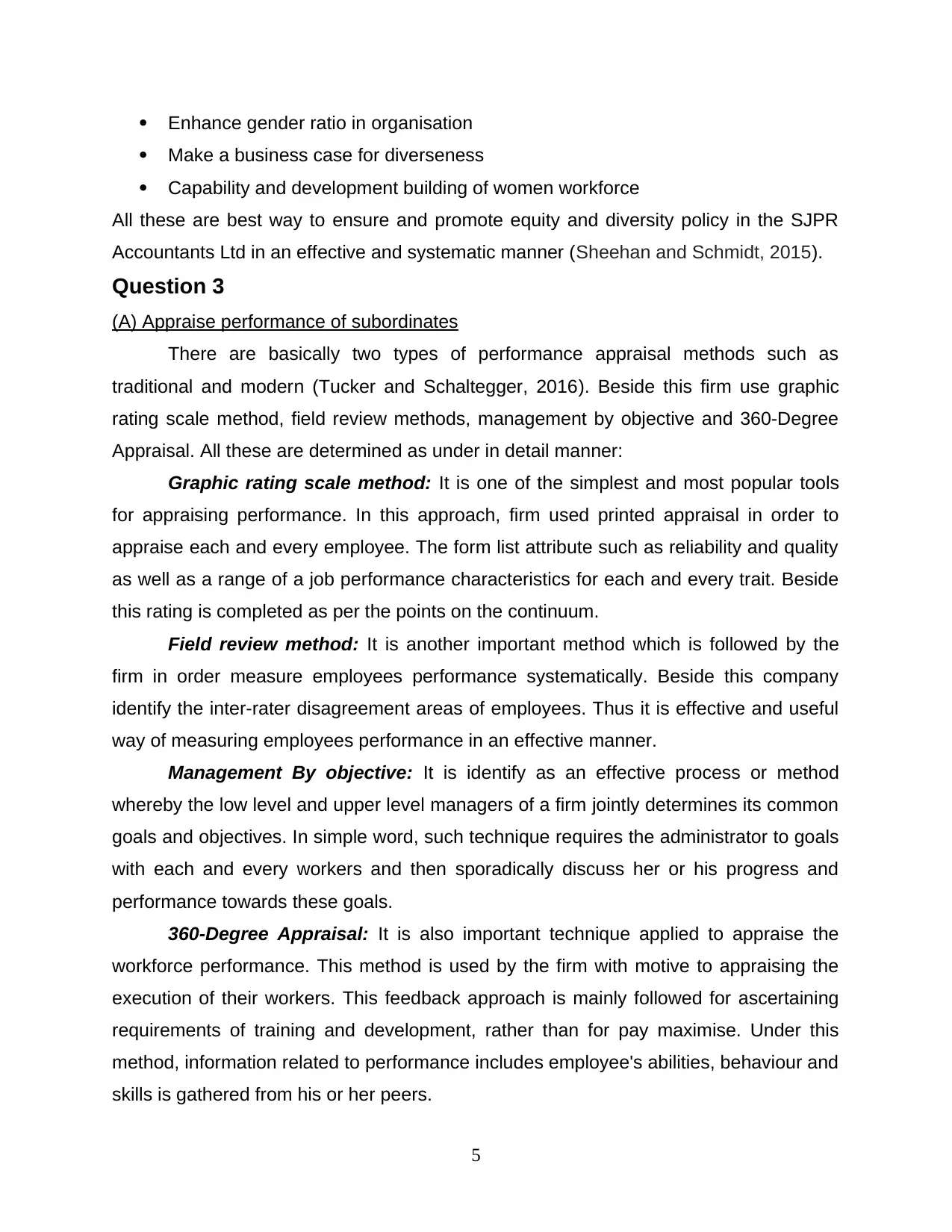
Enhance gender ratio in organisation
Make a business case for diverseness
Capability and development building of women workforce
All these are best way to ensure and promote equity and diversity policy in the SJPR
Accountants Ltd in an effective and systematic manner (Sheehan and Schmidt, 2015).
Question 3
(A) Appraise performance of subordinates
There are basically two types of performance appraisal methods such as
traditional and modern (Tucker and Schaltegger, 2016). Beside this firm use graphic
rating scale method, field review methods, management by objective and 360-Degree
Appraisal. All these are determined as under in detail manner:
Graphic rating scale method: It is one of the simplest and most popular tools
for appraising performance. In this approach, firm used printed appraisal in order to
appraise each and every employee. The form list attribute such as reliability and quality
as well as a range of a job performance characteristics for each and every trait. Beside
this rating is completed as per the points on the continuum.
Field review method: It is another important method which is followed by the
firm in order measure employees performance systematically. Beside this company
identify the inter-rater disagreement areas of employees. Thus it is effective and useful
way of measuring employees performance in an effective manner.
Management By objective: It is identify as an effective process or method
whereby the low level and upper level managers of a firm jointly determines its common
goals and objectives. In simple word, such technique requires the administrator to goals
with each and every workers and then sporadically discuss her or his progress and
performance towards these goals.
360-Degree Appraisal: It is also important technique applied to appraise the
workforce performance. This method is used by the firm with motive to appraising the
execution of their workers. This feedback approach is mainly followed for ascertaining
requirements of training and development, rather than for pay maximise. Under this
method, information related to performance includes employee's abilities, behaviour and
skills is gathered from his or her peers.
5
Make a business case for diverseness
Capability and development building of women workforce
All these are best way to ensure and promote equity and diversity policy in the SJPR
Accountants Ltd in an effective and systematic manner (Sheehan and Schmidt, 2015).
Question 3
(A) Appraise performance of subordinates
There are basically two types of performance appraisal methods such as
traditional and modern (Tucker and Schaltegger, 2016). Beside this firm use graphic
rating scale method, field review methods, management by objective and 360-Degree
Appraisal. All these are determined as under in detail manner:
Graphic rating scale method: It is one of the simplest and most popular tools
for appraising performance. In this approach, firm used printed appraisal in order to
appraise each and every employee. The form list attribute such as reliability and quality
as well as a range of a job performance characteristics for each and every trait. Beside
this rating is completed as per the points on the continuum.
Field review method: It is another important method which is followed by the
firm in order measure employees performance systematically. Beside this company
identify the inter-rater disagreement areas of employees. Thus it is effective and useful
way of measuring employees performance in an effective manner.
Management By objective: It is identify as an effective process or method
whereby the low level and upper level managers of a firm jointly determines its common
goals and objectives. In simple word, such technique requires the administrator to goals
with each and every workers and then sporadically discuss her or his progress and
performance towards these goals.
360-Degree Appraisal: It is also important technique applied to appraise the
workforce performance. This method is used by the firm with motive to appraising the
execution of their workers. This feedback approach is mainly followed for ascertaining
requirements of training and development, rather than for pay maximise. Under this
method, information related to performance includes employee's abilities, behaviour and
skills is gathered from his or her peers.
5
Paraphrase This Document
Need a fresh take? Get an instant paraphrase of this document with our AI Paraphraser
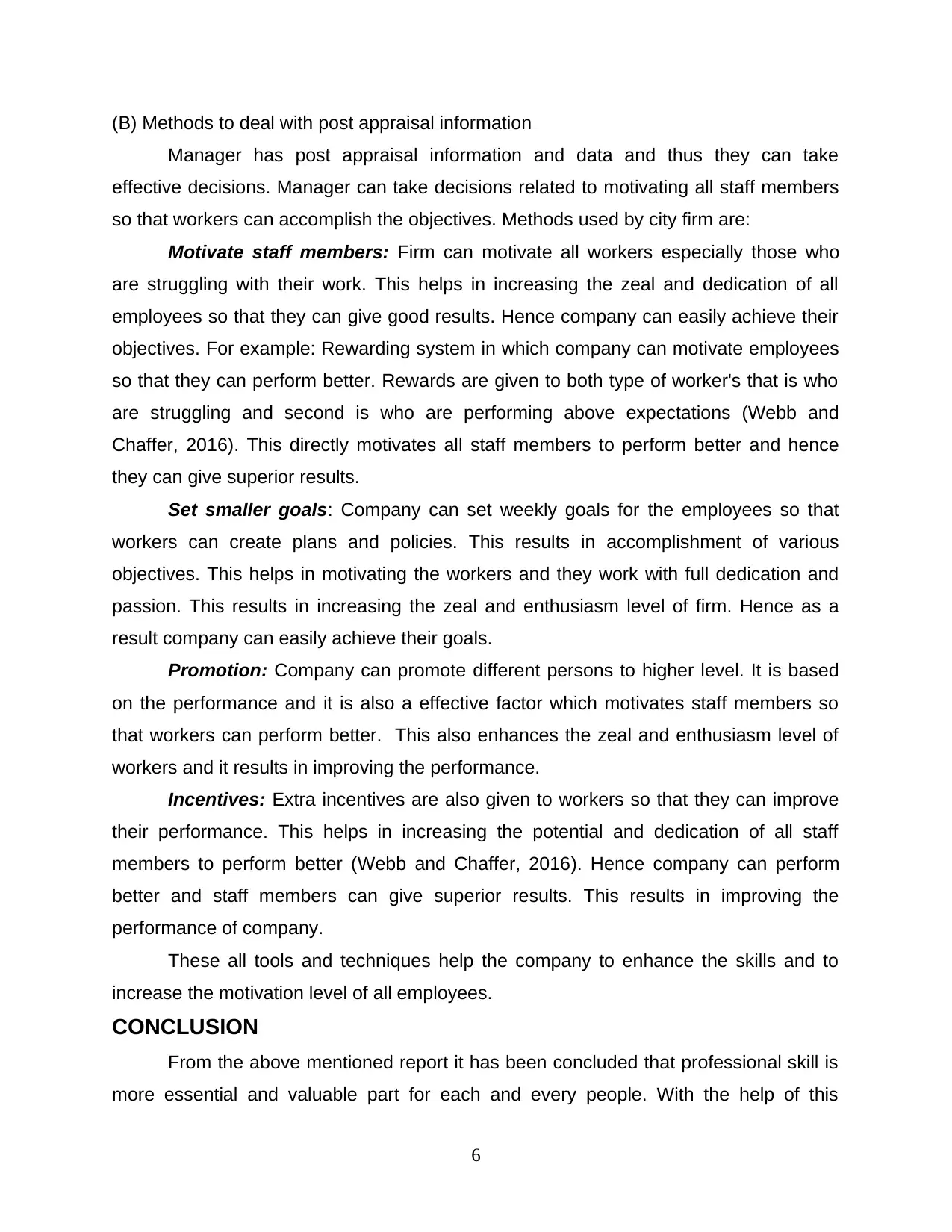
(B) Methods to deal with post appraisal information
Manager has post appraisal information and data and thus they can take
effective decisions. Manager can take decisions related to motivating all staff members
so that workers can accomplish the objectives. Methods used by city firm are:
Motivate staff members: Firm can motivate all workers especially those who
are struggling with their work. This helps in increasing the zeal and dedication of all
employees so that they can give good results. Hence company can easily achieve their
objectives. For example: Rewarding system in which company can motivate employees
so that they can perform better. Rewards are given to both type of worker's that is who
are struggling and second is who are performing above expectations (Webb and
Chaffer, 2016). This directly motivates all staff members to perform better and hence
they can give superior results.
Set smaller goals: Company can set weekly goals for the employees so that
workers can create plans and policies. This results in accomplishment of various
objectives. This helps in motivating the workers and they work with full dedication and
passion. This results in increasing the zeal and enthusiasm level of firm. Hence as a
result company can easily achieve their goals.
Promotion: Company can promote different persons to higher level. It is based
on the performance and it is also a effective factor which motivates staff members so
that workers can perform better. This also enhances the zeal and enthusiasm level of
workers and it results in improving the performance.
Incentives: Extra incentives are also given to workers so that they can improve
their performance. This helps in increasing the potential and dedication of all staff
members to perform better (Webb and Chaffer, 2016). Hence company can perform
better and staff members can give superior results. This results in improving the
performance of company.
These all tools and techniques help the company to enhance the skills and to
increase the motivation level of all employees.
CONCLUSION
From the above mentioned report it has been concluded that professional skill is
more essential and valuable part for each and every people. With the help of this
6
Manager has post appraisal information and data and thus they can take
effective decisions. Manager can take decisions related to motivating all staff members
so that workers can accomplish the objectives. Methods used by city firm are:
Motivate staff members: Firm can motivate all workers especially those who
are struggling with their work. This helps in increasing the zeal and dedication of all
employees so that they can give good results. Hence company can easily achieve their
objectives. For example: Rewarding system in which company can motivate employees
so that they can perform better. Rewards are given to both type of worker's that is who
are struggling and second is who are performing above expectations (Webb and
Chaffer, 2016). This directly motivates all staff members to perform better and hence
they can give superior results.
Set smaller goals: Company can set weekly goals for the employees so that
workers can create plans and policies. This results in accomplishment of various
objectives. This helps in motivating the workers and they work with full dedication and
passion. This results in increasing the zeal and enthusiasm level of firm. Hence as a
result company can easily achieve their goals.
Promotion: Company can promote different persons to higher level. It is based
on the performance and it is also a effective factor which motivates staff members so
that workers can perform better. This also enhances the zeal and enthusiasm level of
workers and it results in improving the performance.
Incentives: Extra incentives are also given to workers so that they can improve
their performance. This helps in increasing the potential and dedication of all staff
members to perform better (Webb and Chaffer, 2016). Hence company can perform
better and staff members can give superior results. This results in improving the
performance of company.
These all tools and techniques help the company to enhance the skills and to
increase the motivation level of all employees.
CONCLUSION
From the above mentioned report it has been concluded that professional skill is
more essential and valuable part for each and every people. With the help of this
6
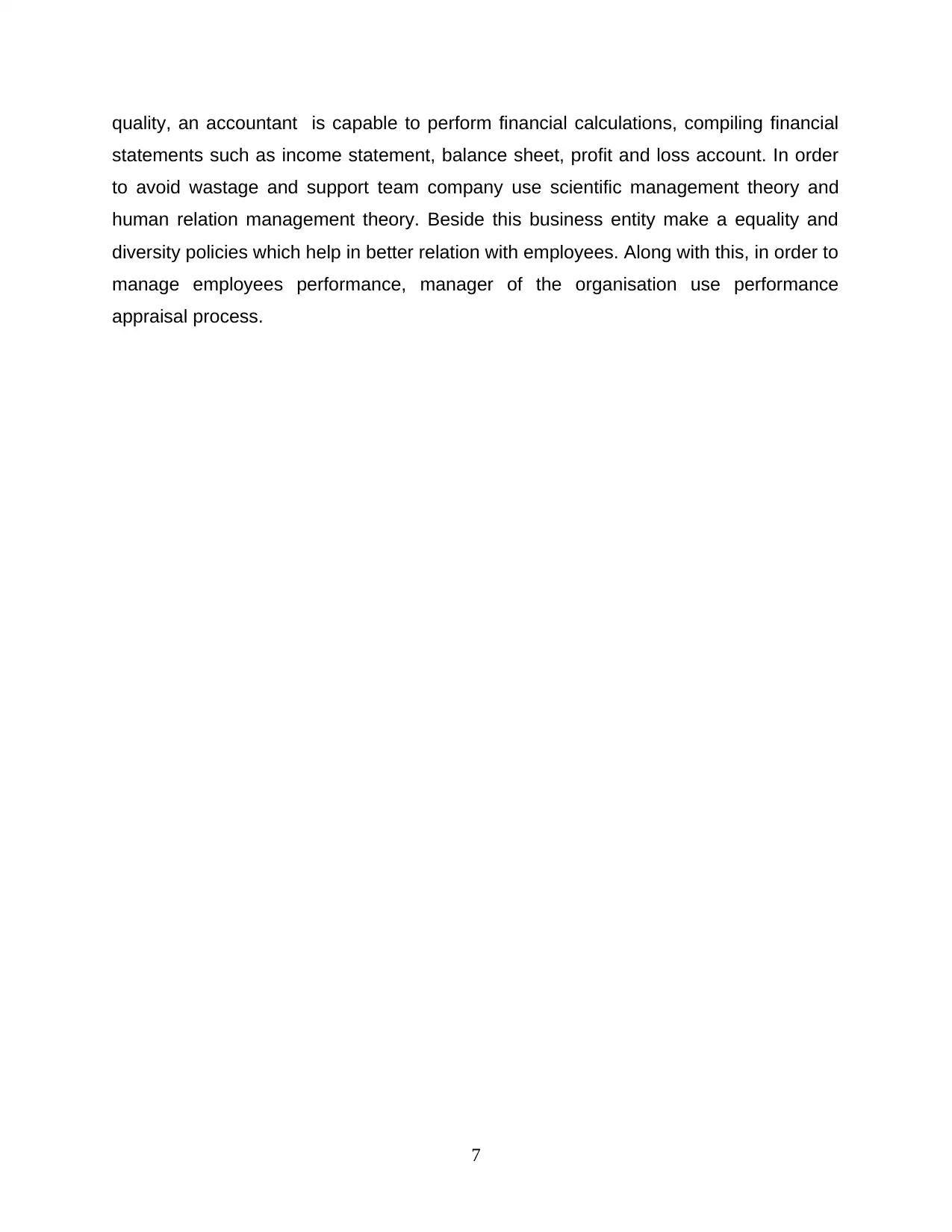
quality, an accountant is capable to perform financial calculations, compiling financial
statements such as income statement, balance sheet, profit and loss account. In order
to avoid wastage and support team company use scientific management theory and
human relation management theory. Beside this business entity make a equality and
diversity policies which help in better relation with employees. Along with this, in order to
manage employees performance, manager of the organisation use performance
appraisal process.
7
statements such as income statement, balance sheet, profit and loss account. In order
to avoid wastage and support team company use scientific management theory and
human relation management theory. Beside this business entity make a equality and
diversity policies which help in better relation with employees. Along with this, in order to
manage employees performance, manager of the organisation use performance
appraisal process.
7
⊘ This is a preview!⊘
Do you want full access?
Subscribe today to unlock all pages.

Trusted by 1+ million students worldwide
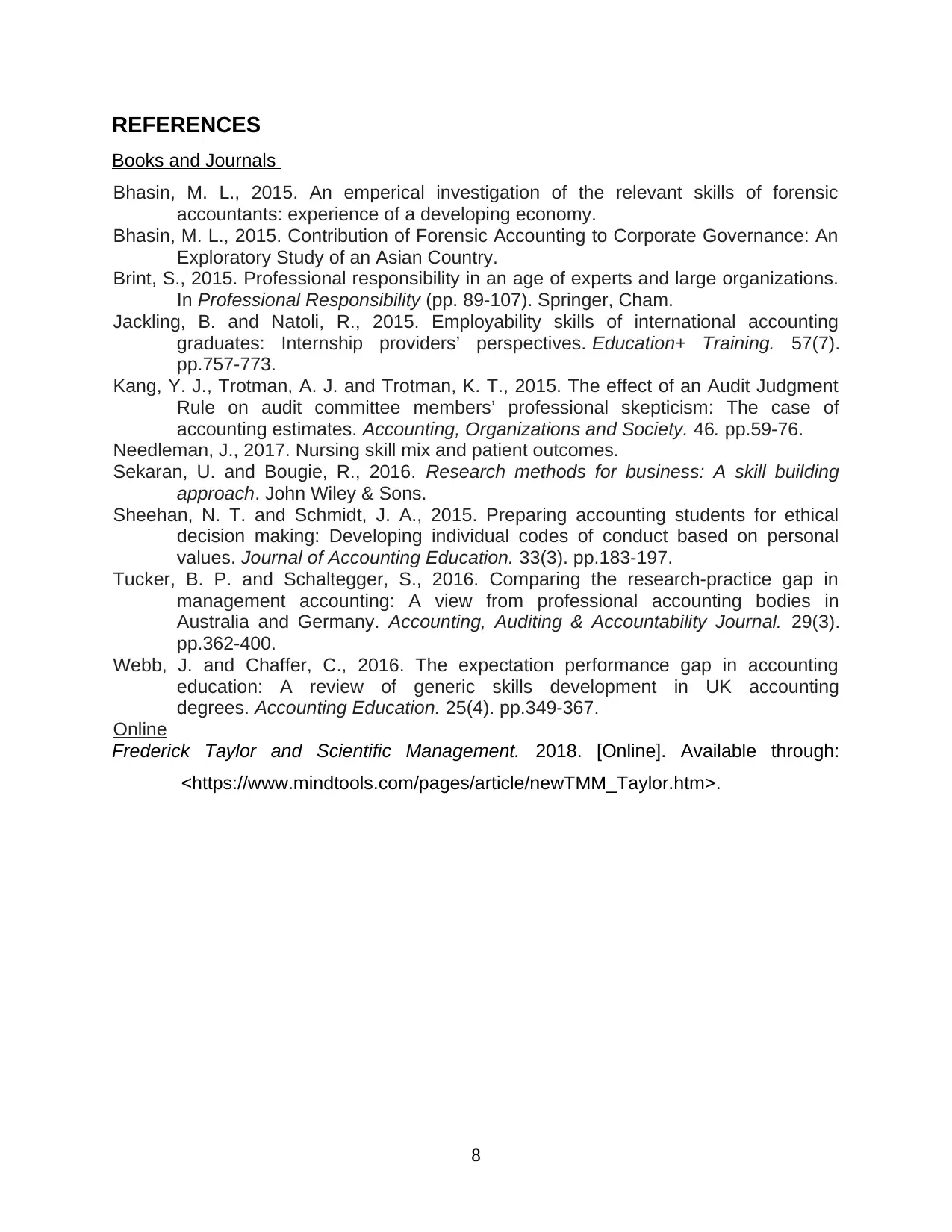
REFERENCES
Books and Journals
Bhasin, M. L., 2015. An emperical investigation of the relevant skills of forensic
accountants: experience of a developing economy.
Bhasin, M. L., 2015. Contribution of Forensic Accounting to Corporate Governance: An
Exploratory Study of an Asian Country.
Brint, S., 2015. Professional responsibility in an age of experts and large organizations.
In Professional Responsibility (pp. 89-107). Springer, Cham.
Jackling, B. and Natoli, R., 2015. Employability skills of international accounting
graduates: Internship providers’ perspectives. Education+ Training. 57(7).
pp.757-773.
Kang, Y. J., Trotman, A. J. and Trotman, K. T., 2015. The effect of an Audit Judgment
Rule on audit committee members’ professional skepticism: The case of
accounting estimates. Accounting, Organizations and Society. 46. pp.59-76.
Needleman, J., 2017. Nursing skill mix and patient outcomes.
Sekaran, U. and Bougie, R., 2016. Research methods for business: A skill building
approach. John Wiley & Sons.
Sheehan, N. T. and Schmidt, J. A., 2015. Preparing accounting students for ethical
decision making: Developing individual codes of conduct based on personal
values. Journal of Accounting Education. 33(3). pp.183-197.
Tucker, B. P. and Schaltegger, S., 2016. Comparing the research-practice gap in
management accounting: A view from professional accounting bodies in
Australia and Germany. Accounting, Auditing & Accountability Journal. 29(3).
pp.362-400.
Webb, J. and Chaffer, C., 2016. The expectation performance gap in accounting
education: A review of generic skills development in UK accounting
degrees. Accounting Education. 25(4). pp.349-367.
Online
Frederick Taylor and Scientific Management. 2018. [Online]. Available through:
<https://www.mindtools.com/pages/article/newTMM_Taylor.htm>.
8
Books and Journals
Bhasin, M. L., 2015. An emperical investigation of the relevant skills of forensic
accountants: experience of a developing economy.
Bhasin, M. L., 2015. Contribution of Forensic Accounting to Corporate Governance: An
Exploratory Study of an Asian Country.
Brint, S., 2015. Professional responsibility in an age of experts and large organizations.
In Professional Responsibility (pp. 89-107). Springer, Cham.
Jackling, B. and Natoli, R., 2015. Employability skills of international accounting
graduates: Internship providers’ perspectives. Education+ Training. 57(7).
pp.757-773.
Kang, Y. J., Trotman, A. J. and Trotman, K. T., 2015. The effect of an Audit Judgment
Rule on audit committee members’ professional skepticism: The case of
accounting estimates. Accounting, Organizations and Society. 46. pp.59-76.
Needleman, J., 2017. Nursing skill mix and patient outcomes.
Sekaran, U. and Bougie, R., 2016. Research methods for business: A skill building
approach. John Wiley & Sons.
Sheehan, N. T. and Schmidt, J. A., 2015. Preparing accounting students for ethical
decision making: Developing individual codes of conduct based on personal
values. Journal of Accounting Education. 33(3). pp.183-197.
Tucker, B. P. and Schaltegger, S., 2016. Comparing the research-practice gap in
management accounting: A view from professional accounting bodies in
Australia and Germany. Accounting, Auditing & Accountability Journal. 29(3).
pp.362-400.
Webb, J. and Chaffer, C., 2016. The expectation performance gap in accounting
education: A review of generic skills development in UK accounting
degrees. Accounting Education. 25(4). pp.349-367.
Online
Frederick Taylor and Scientific Management. 2018. [Online]. Available through:
<https://www.mindtools.com/pages/article/newTMM_Taylor.htm>.
8
1 out of 10
Related Documents
Your All-in-One AI-Powered Toolkit for Academic Success.
+13062052269
info@desklib.com
Available 24*7 on WhatsApp / Email
![[object Object]](/_next/static/media/star-bottom.7253800d.svg)
Unlock your academic potential
Copyright © 2020–2026 A2Z Services. All Rights Reserved. Developed and managed by ZUCOL.




